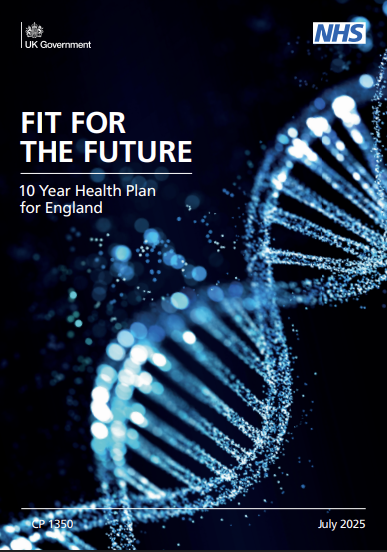BCS Trustee Lois Whittaker has summarised the measures in the 10 Year Health Plan for England, specific to education and training.
Medical Education
The government has commenced a Review of Medical Training in England, led by Professor Sir Stephen Powis and Professor Sir Chris Whitty. Through this, the government intends to modernise postgraduate medical education to better align with the evolving needs of patients, doctors, and healthcare services. Reforms will target delivery, capacity, and quality of training to improve career progression and flexibility – while also supporting doctors to deliver the highest quality care possible.
The government will prioritise UK medical graduates and doctors for foundation and specialty training – seeking to reverse an increase in international trainees of recent years. Over the next three years, it will create 1,000 new specialty training posts in undersubscribed specialties (targeting areas of greatest need).
Over the next 3 years the government will work with professional regulators and educational institutions to overhaul education and training curricula. This will ensure staff leave formal training fully prepared to work in a modern healthcare system and not just “fit for practice.”
Reforms to curricula will provide comprehensive training in the use of AI and digital tools and promote acquisition and retention of generalist skills required for the Neighbourhood Health Service.

There will be a greater emphasis on training staff for the realities of leading and managing modern multi-disciplinary teams. This will be addressed as part of the professional regulators’ review of curricula requirements, and an early priority for the new College of Executive and Clinical Leadership.
A culture of lifelong learning will be embedded, with a focus on skills and competencies that can start delivering for patients as soon as they are acquired rather than trainees waiting until the end of a formal training period.
There will be reforms to clinical placement tariffs for undergraduate and postgraduate medicine, and clinical training course length will also be reviewed.
The aim is to ensure clinical placement activity is provided in the right professions and settings – especially, community settings – and that it harnesses innovative approaches like simulated learning.
The government will work with higher education institutions and the professional regulators as they review course length considering technological developments and a transition to lifelong rather than static training. To ensure changes in curricula quickly lead to changes in course content, DHSC and employers will work in much closer partnership with education providers to ensure that the provision of funding and clinical placements secures the changes required as quickly as possible.
Where existing providers are unable to move at the right pace, the government may look to different institutions to ensure that the education market is responsive to employer needs.
There will also be a targeted expansion of clinical educator capacity.
Increasing Diversity
The government aims to increase the share of under-represented groups starting medical degrees and will work with the Sutton Trust, Social Mobility Foundation, and other partners, to create a more diverse pipeline of homegrown talent. This will include exploring options to improve financial support to students from the lowest socioeconomic backgrounds. The admissions process to medical school will be improved with better information, signposting and support for applicants, and more systematic use of contextual admissions. Expansion of medical school places will be targeted at medical schools with a proven track record of widening participation.
SAS Doctors
The government will work with stakeholders to ensure a more streamlined and predictable pathway is in place for experienced SAS doctors to develop and operate at a specialist level and with the GMC to ensure a more streamlined approach is in place for experienced doctors to become a consultant.
Dentists
Training a dentist costs the taxpayer up to £200,000. The government will now make it a requirement for newly qualified dentists to practice in the NHS for a minimum period of at least 3 years.
Nursing
Currently, 11% of student nurses and midwives do not complete their courses. Addressing attrition rates is a key objective of the Professional Strategy for Nursing and Midwifery being developed by the Chief Nursing Officer for England (CNO), which will be published later this year.
The government will help nursing students overcome financial obstacles to learning, including reducing delays to reimbursement for their placement travel and the time lag between course completion and its confirmation, so that newly qualified nurses can begin work as soon as they are able.
The government will develop advanced practice models for nurses, midwives, and allied health professionals (AHPs) and will increase the number of nurse consultants, particularly in neighbourhood settings. It will introduce neighbourhood nursing and midwifery leads, who will act across multiple neighbourhoods to coordinate local strategy, convene partners, and represent the community’s voice.
Revalidation
To provide real-time feedback and continuous skill development the government has asked professional regulators to review their revalidation systems.
Workforce Plan
The 2023 Long Term Workforce Plan will be replaced by a 10 Year Workforce Plan later this year. The new plan will aim for fewer staff by 2035 than projected by the 2023 Plan. It will also reduce international recruitment to less than 10% by 2035 (currently 34%).
The NHS graduate management training scheme which recruits around 200 trainees per year will be expanded by 50%.
A new NHS management and leadership framework will be published in the autumn 2025, which will include a code of practice, standards, and competencies “from first-line manager to board-level leader” alongside a national curriculum.
New ‘skills escalators will be introduced which will give staff a trajectory for clear career progression, with increasing autonomy. The expectation is that by 2035, every single member of NHS staff will have their own personalised career coaching and development plan, to help them acquire new skills and practice at the top of their professional capability.
The BCS will shortly produce a detailed response to the 10 Year Health Plan.
